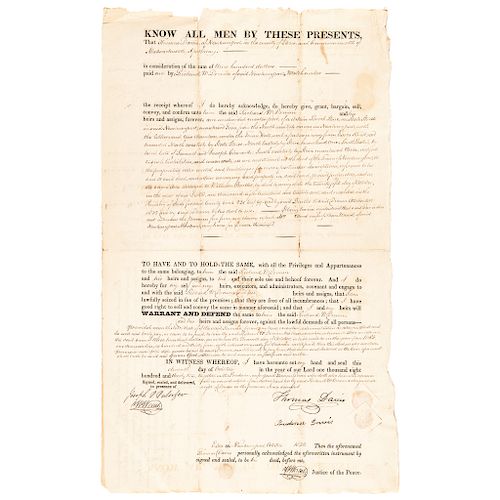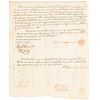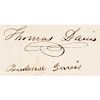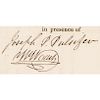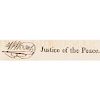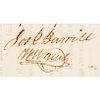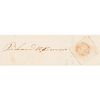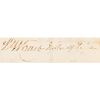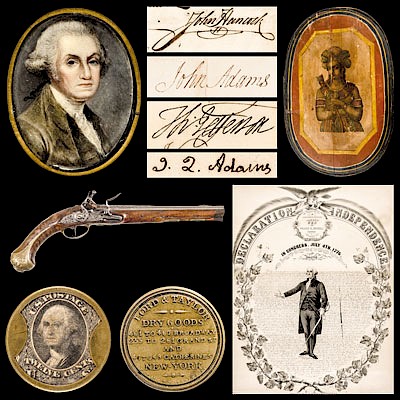1832 JOSEPH P. PULSIFER, Texas Patriot and Founder of Beaumont, Signed Document
Lot 63
Estimate:
$800 - $1,000
Absentee vs Live bid
Two ways to bid:
- Leave a max absentee bid and the platform will bid on your behalf up to your maximum bid during the live auction.
- Bid live during the auction and your bids will be submitted real-time to the auctioneer.
Bid Increments
| Price | Bid Increment |
|---|---|
| $0 | $10 |
| $200 | $20 |
| $300 | $25 |
| $500 | $50 |
| $1,000 | $100 |
| $2,000 | $200 |
| $3,000 | $250 |
| $5,000 | $500 |
| $10,000 | $1,000 |
| $20,000 | $2,000 |
| $30,000 | $2,500 |
| $50,000 | $5,000 |
| $100,000 | $10,000 |
| $200,000 | $20,000 |
| $300,000 | $25,000 |
| $500,000 | $50,000 |
About Auction
By Early American History Auctions
Jun 1, 2019
Set Reminder
2019-06-01 12:00:00
2019-06-01 12:00:00
America/New_York
Bidsquare
Bidsquare : Historic Autographs, Colonial Currency, Political Americana & Revolutionary War Era
https://www.bidsquare.com/auctions/early-american-history-auctions/historic-autographs-colonial-currency-political-americana-revolutionary-war-era-4152
Historic Autographs, Coins, Currency, Political, Americana, Historic Weaponry and Guns, John Adams, Thomas Jefferson, Early American History Auctions auctions@earlyamerican.com
Historic Autographs, Coins, Currency, Political, Americana, Historic Weaponry and Guns, John Adams, Thomas Jefferson, Early American History Auctions auctions@earlyamerican.com
- Lot Description
Autographs
1832 JOSEPH P. PULSIFER Republic of Texas Revolution Patriot and Founder of Beaumont, Texas Document Signed
[Republic of Texas & Texas Revolution] JOSEPH P. PULSIFER, Texas Revolution Patriot and Founder of Beaumont, Texas.
October 11, 1832-Dated, this Document, measuring a large 8.25" x 13.5" confirms the sale of one-quarter interest in a brick store in Newburyport, Massachusetts, Very Fine. This Document as a witness, Signed by Joseph Perkins Pulsifer (1805-61) later the Co-Founder of Beaumont, Texas; (its 1st Postmaster) and Chairman of the Committee of Correspondence during the Texas Revolution, and early Texas Apothecary. Also Signed by Thomas and Prudence Davis, William Woart (1772-1841) Banker & Justice, Richard W. Drown (1795-1888) Watchmaker, and Ralph H. French (d. 1851) Register of Deeds and a State Senator. By this document Thomas and Prudence Davis sell to Richard Drown a quarter interest in a brick store in Newburyport for $3,000. Some expected edge roughness at the top, with tow tiny, minor fold intersection holes. Boldly signed by Pulsifer at lower left as a witness. Overall, nice and clean. Pulsifer, an apothecary, moved to New Orleans from Massachusetts in 1833; two years later he moved to Beaumont, Texas, and opened a mercantile business. While living in Texas from 1832 through 1836, he copied by hand numerous letters from family and friends into a journal. That journal of letters tells a remarkable story of the events of the Texas Revolution as they unfold, including very early accounts of the Siege of the Alamo and the Battle of San Jacinto. That jounal of letters was sold at public auction in 2010 selling for $11,950. In the spring of 1836, Pulsifer was appointed Postmaster of Beaumont, and in that position, he also served as a notary public.
JOSEPH P. PULSIFER, who signs this document as a witness, was born in Newburyport and became an apothecary. From 1827-32 he operated a drugstore in partnership with his brother, Eben, in Charlestown, MA. While in Charlestown he served as secretary of the Mechanics' Society.
In 1832 he returned to Newburyport to work at the apothecary of Thomas Davis and Company. In late 1833 Pulsifer moved to New Orleans and began working with Samuel Mason, a druggist and retail merchant. Mason died 1835 and in July 1835 Pulsifer entered into a partnership with Henry Millard and Texas merchant Thomas B. Huling.
They moved to Santa Anna, Texas (on the Neches River) and opened a store and apothecary trading under the name "J. P. Pulsifer and Company." Pulsifer managed the store. In late 1835 their company bought 50 acres on the Neches River and laid out the boundaries of a new town, which they called "Beaumont."
While at Beaumont, Pulsifer took an active part in the Texas Revolution. Citizens of the Neches River Settlement appointed him Chairman of the Committee of Correspondence, Secretary of the Committee of Safety, and a member of a local committee to draft ideas for a constitution and bylaws for Texas. Committees of Safety, first organized in Texas in 1832, were formed to organize militias to protect locals against hostile Indians.
During the Texas Revolution, Committees were elected to keep Texans informed about revolutionary developments and to effectively organize and defend against the Mexican Army. On March 6, 1836, he was appointed Beaumont's first postmaster. He was also a trustee of the first school in Beaumont.
After the Texas Revolution Pulsifer, Huling, and Millard added 50 more acres to the original Beaumont town site. They then entered into a partnership with Nancy Tevis and Joseph Grigsby, each of whom donated an additional 50 acres, thus increasing the original area of the town to a total of 200 acres. Beaumont ultimately incorporated both Santa Anna and Tevis Bluff, an older settlement about a mile upriver from Santa Anna.
Besides running his store and apothecary, he served as Collector of Revenue for the Port of Sabine, County Clerk, and County Commissioner. Before the first courthouse in Jefferson County Texas was built, court cases were often held at Pulsifer's store. Pulsifer also served as an agent in Jefferson County for the Austin State Gazette. Pulsifer died at Beaumont in 1861.
WILLIAM WOART, who signs four times, twice as Justice of the Peace and twice as a witness, moved to Newburyport in 1801. His primary business was as a merchant and baker. From 1805 until his death in 1831 he was a Notary Public and a Justice of the Peace. On occasion he served as a Special Justice (a type of judge). For his merchant business he produced a token with his name on it. Today it is a prized rarity by collectors of tokens.
One of his sons, Jonathan Loring Woart (1807-38) became, in 1835, the first rector of St. John's Church at Tallahassee, Territory of Florida. In 1838 he died in the explosion of the steamship Pulaski off the South Carolina coast. Another son, John Woart, was rector of Christ Church (Old North Church) in Boston from 1840-53.
RICHARD W. DROWN, the purchaser of the building (probably used as a shop for watch business) was born in New Hampshire and moved to Newburyport at age 15 where he made watches and clocks. He died in Newburyport in 1888.
JOSEPH R. BURRILL, who signs the reverse as a witness, was a member of the Newburyport Common Council throughout the Civil War.
RALPH H. FRENCH, who signs the docket on the reverse side, was Register of Deeds for Essex County. In 1819 he was a Mass State Senator, representing Marblehead.
- Shipping Info
-
Early American provides in-house worldwide shipping. Please contact us directly if you have questions about your specific shipping requirements.
-
- Buyer's Premium



 EUR
EUR CAD
CAD AUD
AUD GBP
GBP MXN
MXN HKD
HKD CNY
CNY MYR
MYR SEK
SEK SGD
SGD CHF
CHF THB
THB